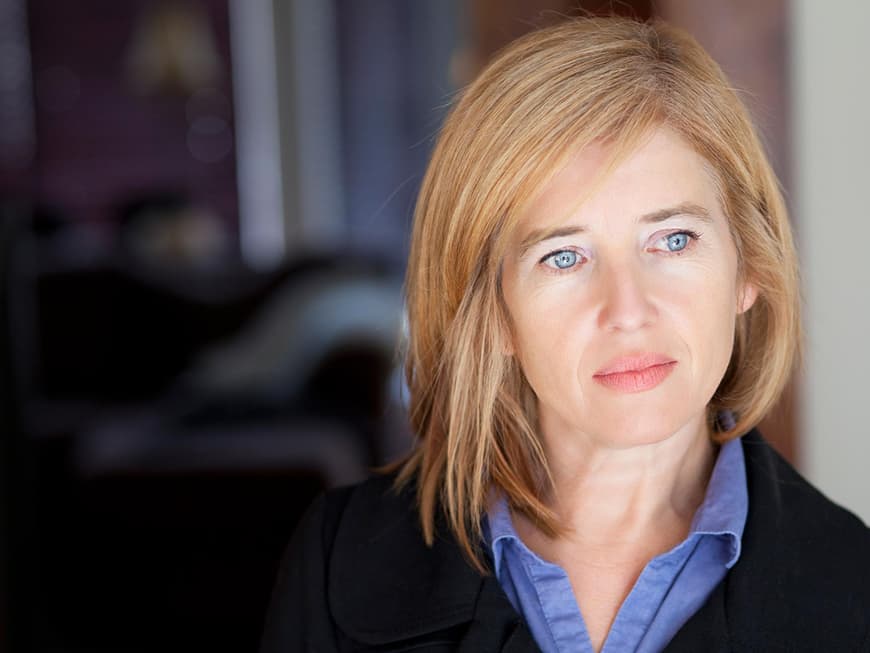
It all started shortly after my 35th birthday: I had an appointment with my gynecologist. Purely routine, actually. But after the examination, my doctor studied my patient file in detail. "I'd also like to send you for an ultrasound," she said. "Your mother died of breast cancer in her mid-40s, so you should go for regular check-ups now."
It pained me to be reminded of my mother's death. I was only 17 years old when she died and I suffered a lot. I had never given much thought to the fact that I could one day, just like her, develop cancer and be torn from life far too early. Until that day.
I was tense during the ultrasound - mainly because the doctor kept running the machine over a spot in my left breast. "The tissue is a little dense here," she mumbled. And then immediately rebutted: "Everything's fine, nothing to worry about." But nothing has been the same for me since then. After that, I felt my breast twice a day, thought I could feel it hardening and was in pain.
Constant fear of getting sick: "A few days after the visit to the doctor, my worries returned"
Over the next six months, I saw my gynecologist four more times, had another ultrasound and a mammogram. The results were always negative. No breast cancer. That reassured me - for the time being. But after a few days at the latest, the worry returned that there might be something wrong after all. I didn't want Lilli, my 13-year-old daughter, to lose her mother as early as I had lost mine. The thought of leaving my child alone made me feel terribly helpless.
And then the stomach pains started. After eating, I often felt an unpleasant pulling sensation in my stomach. From then on, I was very careful about what I ate and avoided fatty foods. I skipped lunch breaks with the other secretaries at the snack bar opposite our office more and more often. When none of this changed anything, I kept thinking: If it's not breast cancer, I might have stomach cancer. Again, I panicked every day that I could be seriously ill. I went for a gastroscopy.
Although I live near Leipzig, I had a second examination at a gastrointestinal center in Hamburg. In both cases I heard: "Mrs. Peters, you are healthy!" I found that hard to believe. After all, even the best doctors can be wrong ...
I slept badly during this time. From month to month, I became less focused at work and felt increasingly overwhelmed. Lately, I've been totally nervous every time I've had new or extensive tasks. My heart was racing and it was beating up to my neck. It was a terrible feeling! The more often I experienced this, the more certain I was that it couldn't be healthy. What if my heart suddenly let me down? As if I didn't already have enough medication and medical equipment at home, I also bought a heart rate monitor and a blood pressure monitor. This was fatal because I soon found myself using the devices all the time - only to discover that my readings were either far too high or far too low.
Psychiatric treatment for hypochondria: "What am I supposed to see a psychologist for? I'm physically ill!"
My husband Hannes and my daughter Lilli observed this with concern. Hannes said I should see a psychologist rather than more doctors. I vehemently refused. How could a psychologist help me if my suffering was physical? I didn't want to be thought crazy.
One day, my boss came up to me and asked if everything was all right, I seemed so nervous lately. My fear of suffering from a serious illness was compounded by the fear of losing my job. I resolved not to let anything show - and definitely not to get ill. I was afraid of viruses. In my condition, flu could be fatal in the worst case scenario. That's why I wore a face mask when I took the train in winter. One morning last March, I suddenly couldn't get out of bed. I was exhausted and had no strength left.
A few weeks later, I followed the advice to seek psychological help. That was my good fortune. In therapy, I understood what was wrong with me: I had completely lost trust in my body and didn't know how to interpret its signals. Through mindfulness exercises, I learned to feel inside myself and to sense how pain and discomfort come - and go again.
I also realized that I had been putting too much pressure on myself, both professionally and privately. I always want to do everything perfectly. Behind this is a deep fear of loss that I've had since my mother died. I still go to the doctor. But only every three months. I make sure I take regular breaks in my everyday life. I don't let them spoil lunch with my colleagues any more. And the face mask? I'm leaving it at home this winter.
